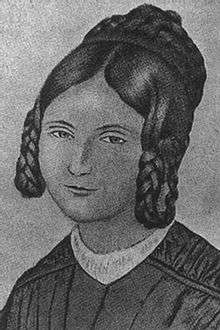Mathilde Franziska Anneke
| Mathilde Franziska Anneke | |
|---|---|
 | |
| Born |
April 4, 1817 Hiddinghausen, Westphalia, Prussia |
| Died |
November 25, 1884 (aged 67) Milwaukee, Wisconsin, USA |
| Organization | SPD, Communist (friend of Karl Marx), Republican Party (United States) (friend of Senator Carl Schurz) |
| Movement | abolitionist, Women's rights movement, German Revolution 1848/49 |
Mathilde Franziska Anneke (April 3, 1817 – November 25, 1884) was a German-American feminist and socialist who dedicated her life to the dissemination of knowledge through her writing, newspapers, and school.
Biography
She was born Mathilde Franziska Giesler in Hiddinghausen, Westphalia, the oldest of twelve children. She was highly educated, as was typical for young women of higher social status during the Biedermeyer period. Her father lost the family fortune, and by 1835, faced bankruptcy. Alfred von Tabouillot, a wealthy wine merchant of French descent, offered to pay off the family debts in return for Anneke's hand in marriage.[1]
Alfred von Tabouillot was an alcoholic, and the unhappy marriage ended in divorce.[1] The ensuing custody battle over the children influenced her feminist views greatly,[2] as Anneke was blamed for the failed marriage despite her husband's alcoholism and abuse.[1]
She later married Fritz Anneke, a former Prussian artillery officer, whom she had met in Münster, Westphalia, and the couple began publishing a daily newspaper for the working class in Cologne. When Fritz was jailed for his political activities, Mathilde continued to write, manage, and publish the paper until it was banned by the authorities in 1847. One year later, Mathilde started a new paper, the first German feminist newspaper, Frauen-Zeitung, in 1848.[2] Upon his release from prison, Mathilde later travelled with Fritz during the Prussian invasion of the Palatinate, writing about it.[3] In May 1849, she rode alongside Fritz as an unarmed orderly and served as a messenger.[1] After the Prussian victory, the couple fled Germany and emigrated to the United States.
They settled in Milwaukee, where Anneke established herself as a feminist author and publisher, becoming a friend and colleague of Susan B. Anthony and Elizabeth Cady Stanton.[4] In March 1852, Mathilde started the first feminist journal in the United States published by a woman, the Deutsche Frauen-Zeitung.[2]
The Annekes were vocal opponents of slavery during the American Civil War. Fritz served in the Union army, as colonel and commanding officer of the 34th Wisconsin Volunteer Infantry Regiment. Mathilde and Fritz's son Percy Anneke became later an entrepreneur in Duluth, Minnesota, where he was one of the founders and owners of Fitger Brewing Company until he sold his shares at the beginning of the prohibition and moved to Pasadena, California.
In 1865, Anneke founded a girls' school in Milwaukee that remained open until 1884.[1]
In 1858, four of Anneke's children caught smallpox and died. Her husband Fritz had refused to allow the family to be vaccinated. Shortly thereafter, Fritz traveled to Italy to report on the Italian independence movement; he and his wife would not live together for a long time.[1]
Two key works of Anneke have been recently re-published in the United States in English translation: "Women in conflict with society" (a pre-1848 text on the fate of Louise Aston) and "Broken Chains" (a series of articles against slavery). Anneke published in German which was still widely used in the United States during the 19th century.
References
- Susan L. Pieper: Mathilde Franziska Anneke - The Life and Works of a German-American activist: Peter Lang Inc., USA, 2005, ISBN 978-0820479132. (including translations of her books "Women in conflict with society" and "Broken Chains")
Notes
- 1 2 3 4 5 6 Richards-Wilson, Stephani. "Mathilde Franziska Anneke (née Giesler)." In Immigrant Entrepreneurship: German-American Business Biographies, 1720 to the Present, vol. 2, edited by William J. Hausman. German Historical Institute. Last modified June 30, 2014.
- 1 2 3 http://www.wisconsinhistory.org/topics/anneke/index.asp
- ↑ http://www.caseint.com/edward/anneke.htm
- ↑ Anneke, Mathilde Franziska (Giesler) 1817 - 1884
External links
- John "J-Cat" Griffith (Jan 1, 2001). "Mathilde Anneke". Social Reformer, Suffragist. Find a Grave. Retrieved Aug 17, 2011.